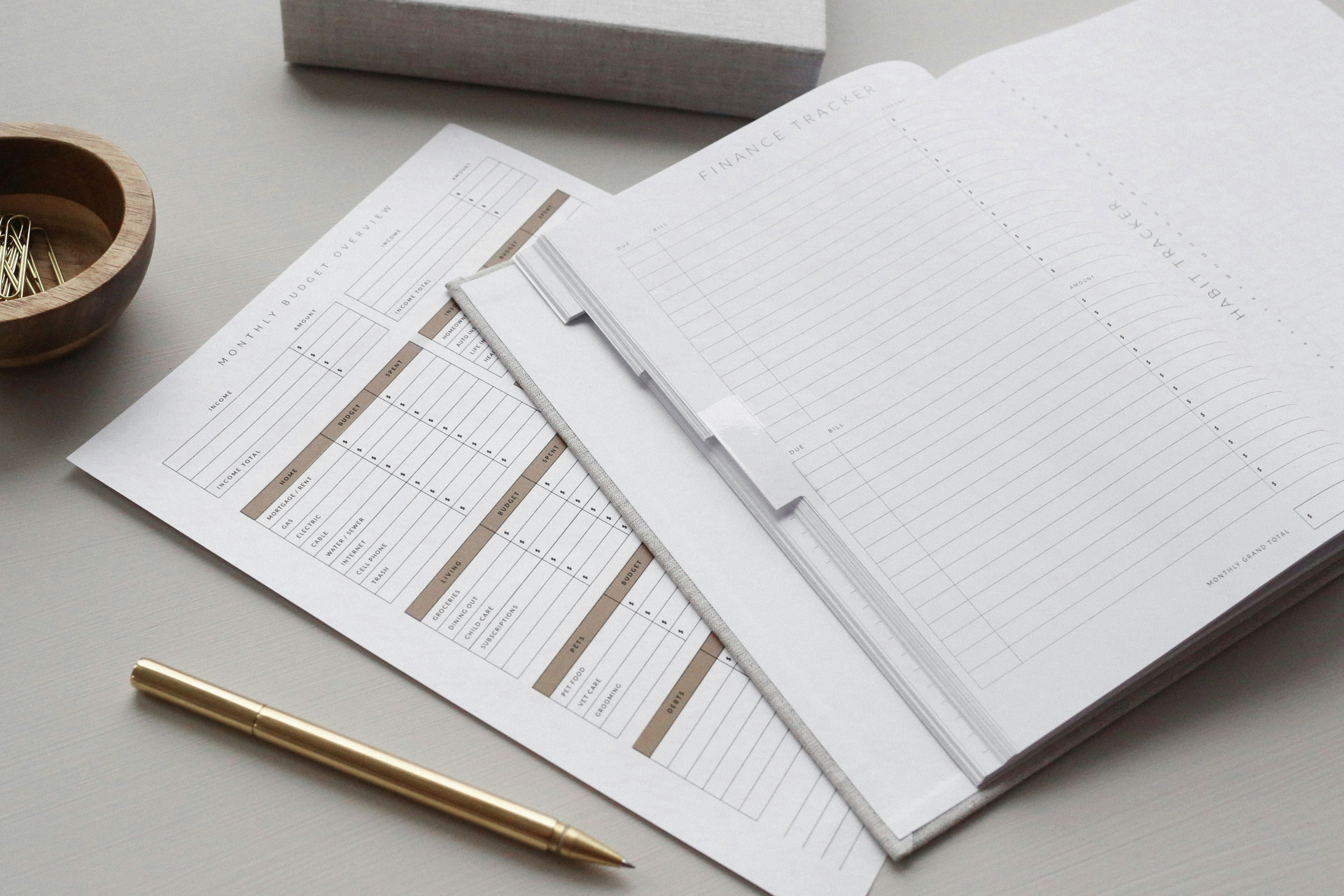How To Boost Your Financial Wellbeing In 2024
By
1 year ago
Top tips for keeping your finances on track this year

So you’re getting your vegetables in and exercising a few times a week – but what steps are you taking to improve your financial wellbeing? Nowadays there’s constant talk about our physical and mental health, but many of us still shy away from discussing the financial side of things, which can affect all aspects of our lives. Life is more expensive than ever nowadays, and worries about money can be all-consuming – but there are tools out there to help us feel more in control.
Here, we chat to financial investment expert Ayesha Ofori about simple ways we can boost our financial wellbeing. Ayesha spent years working in banking before deciding to set up her own company, Propelle, a community-based fintech platform designed to help women invest and build their own wealth. She shares the expert advice she’s learned from many years in the financial industry, covering everything from emergency funds to money cleanses and venturing into the world of investing.
Q&A with Ayesha Ofori: Top Tips For Improving Financial Health
How would you describe financial wellbeing?
For me, financial wellbeing goes beyond just having enough money. Financial wellbeing encompasses elements such as financial literacy, the ability to budget effectively, save for the future, invest wisely, manage debt responsibly, and plan for emergencies. It is about having the necessary resources, knowledge, and skills to effectively manage finances and achieve financial goals. It is about people feeling secure about their financial decisions, and that they have a sense of control over their financial future. We put so much focus on our physical and emotional wellbeing but if our financial health isn’t great, it can affect every area of our lives – that’s why I think it’s so important to prioritise it.
What are some signs someone might be struggling from poor financial wellbeing?
The most obvious sign is that you worry about money (whether that be worrying about not having enough today or in the future) – it’s important for us to be aware of our finances but they shouldn’t rule our everyday life. Signs that you’re struggling from poor financial wellbeing can manifest in various ways. It could be that you consistently run out of money before the end of the month, or you have a lack of savings to cover emergencies or unexpected expenses, or you have debts you struggle to pay. Some people have high levels of stress or anxiety when it comes to just discussing finances – I am sure most people have experienced at least one of these at some point in their life.
View this post on Instagram
What are your top three suggestions for improving one’s financial wellbeing?
1. Build your knowledge and your confidence through financial education
The lack of knowledge typically results in lack of confidence and financial literacy. Personal finance isn’t something that’s taught at school and money isn’t openly talked about – 70 percent of millennial women have never received any financial education, so it’s no wonder there are large gaps in individuals’ knowledge around their money, which in turn can lead to a lack of confidence when it comes to money and investing. It is so important that people educate themselves when it comes to budgeting, savings, investments, and planning for the future. At Propelle, financial education is important which is why we provide access to resources, workshops and tools that empower individuals to make informed financial decisions and build healthy financial habits.
2. Review, budget, save and invest
Start with the basics by reviewing your finances, working out monthly earnings and expenses. Create a spending plan, develop a detailed budget for your expenses, including food, bills and other expenses. Having a plan will give you a sense of control. Set realistic financial savings and investing goals both long term and short term – you may want to try and save £100 a month and invest £100 a month or it could be saving and investing for something specific like a holiday, getting a new car or planning for retirement.
3. Join the conversation
Conversations around money and investing are still not normalised or as commonplace as they need to be. Empowering women to discuss money and wealth openly is essential for achieving financial equality and equity, resulting in financial wellbeing. It allows women to advocate for their financial needs, make informed decisions, and challenge outdated gender norms. Through Propelle women have access to an online community chat that provides a safe space where women can share their investment journeys or investment wins, ask any questions and get the financial guidance they need. We can also introduce women to a range of experts if they need more help, such as financial coaches, financial advisers, mortgage brokers, life coaches, accountants, tax advisers, wellness experts etc.
What is a financial cleanse and how can it be useful for people trying to change their spending habits?
A financial cleanse can be really useful as it gives people the opportunity to review and reset with a goal to bettering your spending habits and ultimately finances. By identifying your financial toxins (debt, overspending, unhealthy financial habits that potentially harm your financial wellbeing) you can work out what you need to cut back on (perhaps you eat out quite often which costs quite a bit of money) and can therefore make more balanced financial choices leading to a better financial future.
Should everyone have an emergency fund? How should we decide how much to aim for?
An emergency fund can be incredibly valuable to help you deal with unplanned major expenses or life events. Women tend to have additional responsibilities and tend to take time off work, such as time out to have children or caring for elderly relatives. These responsibilities have an impact on our ability to save and invest, and can result in much smaller pensions later in life. As such, it’s important to build up an emergency fund to make sure that you could manage financially if you do have to take time off work, especially if it’s unexpected. Deciding on how much to aim for will be down to your individual circumstances. If you have children that depend on you, an emergency fund may be enough to cover three to six month’s worth of living expenses in case of job loss, however if you live at home with no dependents your emergency fund will be different.
Tell us about Propelle. Why did you decide to launch it and what was your aim?
I’m an ex-banker and spent around 10 years in banking altogether, starting at Morgan Stanley and finishing my banking career at Goldman Sachs where I was an ultra-high net wealth adviser. Most of my clients were men and I’d often think: where are the women? Why don’t women have any money? If they do, why aren’t they investing it?
I came across the Japanese philosophy Ikigai and I also realised that I wanted to do something that would allow me to have a purpose in my life and also help me work toward creating a lasting legacy. I got to a point where I started to think about being old and grey and how I wanted to be remembered and what impact I wanted to have on the world. It dawned on me that helping just the uber-wealthy to get even richer didn’t align with my values or the impact I wanted to have.
My focus on helping women was obvious to me. The stats speak for themselves: women still retire with over 40 percent less than men, the UK’s gender investment gap is similar to the GDP of Switzerland at £599 billion, the gender pension gap in the UK is double the size of the gender pay gap, but it doesn’t get as much airtime. So I set out on my mission through Propelle to empower women to build stable financial futures and close the gender investment gap and the gender pension gap.
Propelle is a female focused investment platform designed to get women investing confidently and building long-term wealth in order to close the gender investing and gender pension gaps. Centred around three key pillars: financial education, community and investing, Propelle completely redefines investing for women. We have created what we call the UK’s first ‘lifestyle investment platform’ – as desired and as easy to access and use as some of the most loved female lifestyle companies. With Propelle, women no longer think of investing as ‘stuffy’ or ‘not for them’ or the thing that they will do at some point in the future, investing becomes so natural and commonplace, part of their everyday life.

Unsplash
Stats show women are less likely to invest than men. Why do you think this is?
Many women still think that money and investing is more something men do. There are lots of misconceptions around women and finance which need to be broken down, such as the view that women are seen as being more reserved when it comes to finances. This simply is not correct; this is only because in the past women have been given fewer opportunities to learn and physically invest. The lack of knowledge typically results in lack of confidence and financial literacy. It is not that women are not clever enough or savvy enough to invest, it is due to a lack of tools that resonate with them, that address their unique investment needs. The evidence shows that women have more cash ISAs (i.e. they are saving) rather, whilst men are more likely to have a stocks and shares ISA (i.e. they are investing). But we can also see that when women do invest, they get better results than men – so we need to mobilise more women to take investment action.
Another barrier preventing women from investing more is that they tend to factor in how they feel about investments from a risk perspective more than men do. Women are not necessarily more risk averse than men, instead we are more risk aware! What women actually need is more information before making an investment decision and whilst this information has always been there, it has never been delivered in the right way. At Propelle, we know this, which is why one of the tools that the team developed is a risk tool to help women better understand what risk is and begin to understand how to work out what their own risk appetite might be.
Do you think there is a wider gender gap surrounding financial literacy?
Absolutely. Over the years, history and society has ingrained it into women that you don’t talk about money and finances – talking about it is seen as uncouth and taboo. Traditionally the man of the house was the breadwinner and looked after the finances – women couldn’t have their own bank account until the 1970s. We’re only talking about a few generations where we’ve started to see a significant societal change when it comes to women and their money. So whilst there has been a physical change (and there’s still work to do), it’s harder to shift these inherited money beliefs, the mindset impacts and the generational impact that this has had on women and their finances.
Financial education helps to build confidence around money and investments, which in turn helps to make women more comfortable with investing. But it must resonate with them and be ‘quality’. Women are busy, they want short content they can easily digest. All of Propelle’s educational content is written using language and context that they can relate to.
Also, the community features in the Propelle platform are designed to normalise conversations for women around money, wealth and investing. Our online community chat provides a safe space where women can proudly and unashamedly share their investment journeys or investment wins, ask any questions, and get any financial guidance they may need. For some women, the community is a useful way for them to sanity check information they are being told elsewhere. We have seen that women themselves are a key driving force behind getting other women to do what they need to do to take investment action – our platform encourages and facilitates this.
Top three tips for a beginner keen to venture into investing?
One of the big misconceptions around money is that investing is only for people with a lot of it. The reality is, you can start investing with a small amount and build from there. So, my advice to anyone would be to take action and just start! Even if it’s with £1. Once you start, it helps to break some of the psychological barriers.
Secondly, investing doesn’t need to be complicated although sometimes it can feel like it is. If you invest, have your investments in a manageable portfolio. The same can be said for bank accounts! If you have multiple accounts to keep track of it can be overwhelming, so try and consolidate accounts where you can so that it is easier for you to stay on top of your finances and easier to track. Remember, this doesn’t mean put your money all in one place, it’s still important to diversify your portfolio to spread the risk, but just ensure you can stay on-top of everything.
Finally, educate yourselves. Financial education helps to build confidence around money and investments, which in turn helps to make women more comfortable with investing.
Find out more about Propelle and sign up at propelle.io









